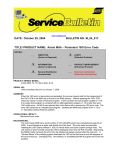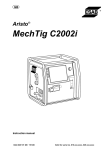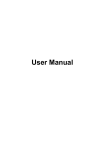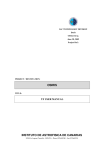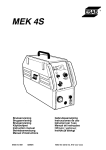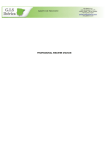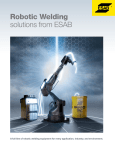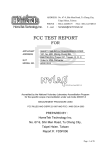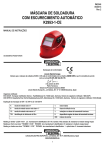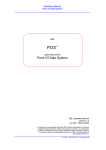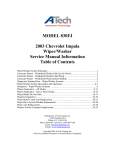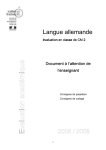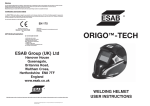Download ESAB-Aristo-tech-User Manual GB- page1
Transcript
Warning The auto-darkening filters fitted in the Aristo®Tech helmets only resist a certain amount of heat. Please do not place them near naked flames or hot work areas etc. Operating temperature of electronic filter minus 10ºC to plus 55ºC. Materials that may get in contact with the wearers skin could cause Allergic reactions to susceptible individuals Certification and Control labels The Aristo®Tech welding filters are tested for eye protection by the following notified body: DIN Prüf-und Zertifizierungsstelle für Augenschutz, Westliche 56, D 75172 Pforzheim, notified body 0196, that provides approval and continual quality system under the control of the European Commission, the German Ministry for Work and the Central Office of the Provinces. We are therefore allowed to use the following marks: EN 379 European Conformity mark. This confirms that the product fulfils the requirements of the Directive 89/686/EWG Address from DIN CERTCO as Notified Body 0196 DIN CERTCO Gesellschaft für Konformitätsbewertung mbH Gartenstraße 133 D-73430 Aalen GERMANY ADF Marking Explaination: CE 4/5-13 ESAB 1/1/1/2 EN379 4 - light state scale number 5- lightest dark state scale number 13 darkest state scale number ESAB - Manufactures identification 1 - Optical class 1 - Diffusion of light class 1 - variation in luminous transmittance class 2 – angle dependency class 379 - Number of the standard ESAB Group (UK) Ltd Hanover House Queensgate, Britannia Road, Waltham Cross, Hertfordshire EN8 7TF England www.esab.co.uk ESAB AB operates a policy of continuous improvement. We therefore reserve the right to make changes and improvements to any of our products without notice. WELDING HELMET USER INSTRUCTIONS ATECH-01-UI-Ra Aristo®Tech User Manual Aristo®Tech: Information manual for the Aristo®Tech welder protective helmets complying with Par. 1.4 of Appendix ll of the EC regulations. The Aristo®Tech welding helmets are high quality products that contribute to the comfort and safety of the welder. Aristo®Tech welding helmets may be used only in connection with arc welding. The chart below shows how to choose the most suitable shade level: To allow the filter to switch, both sensors on the front of the filter must not be covered. The filter then switches to the dark state when the arc strikes and to the clear state when it stops. The filter switches to the light state when the welding arc stops How to set the shade: Current internally in amperes 0.5 Welding process Or related techniques 1 2.5 10 5 15 20 E manual Flux core electrodes Fluxed stick electrodes 30 40 60 80 100 10 9 125 150 10 11 10 11 10 9 11 Plasma cutting (Fusion cutting) Micro-plasma welding Centre and outer gas: Argon (Ar/H2) (Ar/He) 11 11 2.5 4 5 6 7 10 9 8 12 12 The Aristo®Tech operates with a digital switching system. To set the shade turn the forward knob on the outside of the helmet 1 time and then release. All Functions are viewable with the internal LCD display. 500 13 14 13 14 14 The most suitable setting can be found on the Chart in this brochure or chosen using your experience. This setting can also be made manually during the welding process. 14 13 14 14 1 Turning clockwise = darker Turning anti clockwise = clearer 15 Before using the filter we recommend the following adjustments are made: 15 15 Insure the sensitivity is at the max. setting (pos. 2). Depending upon the surrounding light the filter will switch to the dark state or will flicker (if the surrounding light is very low, the filter may not switch to the dark state). 13 13 12 11 400 450 13 13 10 Plasma cutting (fusion cutting) All weldable metals see WIG Centre and outer gas: Argon (Ar/H2) (Ar/He) 350 13 12 12 Electric arc compressed air joining (Melt joining) carbon electrodes (O2) Flame grooving compressed air (O2) 300 12 12 11 10 250 275 12 MIG / Metal-Inert-Gas Argon (Ar/He) Aluminium, copper, nickel And other alloys. MAG / Metal-active Gas(Ar/Co2O2) (Ar/Co2/He/H2) Construction Steel, hardened & tempered steels Cr-Ni-steel, Cr-steel & other alloyed steels. 200 225 11 MIG / Metal-Inert-Gas Argon (Ar/He) Steels, alloyed steels, Copper & its alloys etc. TIG / Tungsten-Inert Gas Argon (Ar/H2) (Ar/He) All weldable metals such as: steels, aluminium, Copper, nickel and their alloys. 175 2 Adjust the sensitivity knob (pos. 2) until the filter switches to the clear state. 15 The filter is now set to its optimum sensitivity (According to the surrounding light conditions). 0.5 1 2.5 5 10 15 20 30 40 60 80 100 125 150 175 200 250 300 400 500 225 275 350 450 3 Range of use for the Aristo®Tech: Depending upon the application conditions, the next highest or next lowest protection level can be used. The darker fields correspond to those areas in which the corresponding welding process cannot be used. All arc welding applications with the exception of TIG>5A and pulse inverter. Available shade - 5-13 (pos.1). Information Replacing the Outer Spatter Lens Aristo®Tech welding helmets afford reliable protection for the eyes whilst electric arc welding. They offer permanent protection against UV/IR rays, heat & sparks in any state from the clear to dark. The protection shades of the Aristo®Tech welding helmets have been chosen to avoid eye damage caused by the welding arc. Do not look directly at welding rays with unprotected eyes when the arc strikes. This can cause a painful inflammation of the cornea and irreparable damage to the lens of the eye leading to cataracts. Aristo®Tech welding helmets allow the welder to see the point of arc strike more precisely. This leads to a real time saving. The helmet does not have to be flipped up and down during welding, both hands are kept free and because of the helmets lightweight fatigue is reduced. Ensure that the helmet is always equipped with : an Outside Lens (before the filter, on the outside of the helmet) and an Inner Lens (behind the filter, inside the helmet). Range of application: The Aristo®Tech welding helmets can be used for the following applications: Electrode MIG Mag Tig (>5A) They are not suitable for use with laser systems and oxy-acetylene (gas welding) applications. The welding filter must not be used for any other purpose other than welding. They should never be used as sunglasses when driving as this could lead to incorrect identification of the colour of traffic light. The welding filters operate well under extreme low lighting and very strong sunlight. Warning These protection lenses must be replaced if broken, damaged or covered with welding spatter to such an extent that vision is impaired. Inner & Outer Lenses are consumables and must be replaced regularly with certified Aristo®Tech cover plates. Use of non - Aristo®Tech cover plates will void warranty. Before using the Aristo®Tech helmet for the first time the protective films must be removed from the Front Spatter Lens (drawing 1), The films cannot be removed from the Front Spatter Lens with the Lens in place, Please follow the instructions below to remove the Spatter Lens. LAN GS 0196 in p Drawing 1 7 Aristo®Tech welding helmets are equipped with a comfortable headgear that can be adjusted in Four different ways. 6 Angle adjustment Welding helmet angle depending on work set-up 8 1 4 5 Push and turn “Head size” 3 2 3 2 Servicing and maintenance Spare parts for Aristo®Tech Welding Helmets Items without a part number are not available as spare parts No. Part # Description CE HL: D: Voor gebruik Vor F: Gebrauch folie verwijdere UK: Enlever Before le film Schutzfoli I: n!! protecteur e Prima use entfernen! de’ll remove avant uso protective ! togliere utilisatio coating!! la protezione Adjustment of headgear: Back and Forth “Distance from face” The Delay is adjusted from the inside. You have 8 settings including grind Mode. Push the button until you reach the desired delay 1F DINplus Operation Push and Move “Head Height” Setting the delay Drawing 2 Inserting and removing a new protection lens: To insert the new outer protection④ lens the filter must be removed by moving the 2 retainer screws ¼ turn⑧ from the inside of the helmet①. The old protection lens can then be removed and the new lens inserted. Turn the ¼ turn screws to lock in place (see drawing 2). COMPLETE UNITS 0700000353 0700000354 0700000355 0700000356 0700000357 0700000358 0700000359 0700000360 0700000361 0700000362 0700000363 0700000364 SPARES 1 0700000365 1 0700000366 1 0700000367 2 0700000368 3 0700000369 4 0700000370 5 0700000371 6 0700000372 7 0700000373 ® Aristo Tech 5-13 Black Aristo®Tech 5-13 White Aristo®Tech 5-13 Yellow Aristo®Tech 5-13 Black prepared for fresh air Aristo®Tech 5-13 White prepared for fresh air Aristo®Tech 5-13 Yellow prepared for fresh air Aristo®Tech 5-13 Black with internal visor Aristo®Tech 5-13 White with internal visor Aristo®Tech 5-13 Yellow with internal visor Aristo®Tech 5-13 Black with Hard Hat & Fresh Air Aristo®Tech 5-13 White with Hard Hat & Fresh Air Aristo®Tech 5-13 Yellow with Hard Hat & Fresh Air Helmet Shell Aristo®Tech - Yellow Helmet Shell Aristo®Tech - Black Helmet Shell Aristo®Tech - White Headgear Aristo®Tech Sweat Band Front Cover Lens Aristo®Tech Inside Cover Lens Aristo®Tech Cartridge 5-13 ADF Assembly Potentiometer/Sensitivity Knobs Filter Testing: Aristo®Tech welding helmets should not be dropped. Do not place heavy objects or tools (hammers etc.) on or inside the helmet so as not to damage the electro-optical filter. Before use of the welding helmet the auto darkening filter (ADF) and helmet needs to be checked according to the following procedure: Always make sure that the helmet is equipped with an outside and inner lens (in front of the filter on the outside and on the inside behind the filter). These protection lenses must be replaced if damaged in any way (see overleaf). They are consumables and should be checked and replaced regularly. Spatter voids Warranty. Check outer protection lens is clean and can be seen through. The filter should be cleaned when changing the protection lenses. This can be done by any of the following ways: Wipe with a clean, dry piece of cloth. Clean with a piece of smooth cloth moistened with pure alcohol. Clean with a commercial disinfectant If used properly the welding filter requires no further maintenance during its lifetime. • • • • The only AD filter that can be replaced in an Aristo®Tech welding helmet, is an Aristo®Tech AD filter. Use of any other type of AD Filter negates all approvals and may be harmful. The filter itself contains no special or toxic products and can be disposed of in the same way as other electronic devices. Ensure the sensors are not covered in any way and are clean. Once these checks have been carried out you can now test the ADF. Turn the outside shade knob to the darkest setting (shade 13) and set the sensitivity to the highest setting (turning clockwise). Now point the sensor towards a light source such as an overhead light, lamp etc. The ADF should now switch to the dark state (please note if the ADF is stored in a dark area away from light it may need to be left out in strong light for 20 minutes to absorb power, if after 20 minutes if the ADF does still not react then there is an issue with the sensor). Once the filter is in the dark state you can check the shade variation is functioning correctly, simply turn the shade knob anti-clockwise. By doing this, the shade should get lighter. If the shade does not appear to alter then you have an issue with the shade variation. To test the delay function set the delay to the maximum setting. Now move the filter sensor away from the light source it should take 1 second to return to the light state, now alter the delay setting to the minimum and repeat the process, the time taken to return to the clear state should be 0.1 second. If the ADF does not react in this way then there is an issue with the delay function. Testing the sensitivity. Set the sensitivity to minimum setting now point the ADF at the light source you used to test the other functions (if filter switches to dark state move away until the filter returns to clear state) slowly turn the sensitivity clockwise until the filter switches to dark state (if it does not then move closer to the light until it reacts). If the ADF does not react then there is an issue with the light sensors. If any of the functions fail during test or in use then please do not use the ADF and contact your local distributor.



